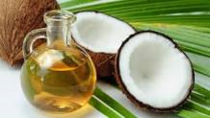Organic coconut oil: A superfood with amazing health benefits
Article from Natural news by Chris Sumbs
June 22, 2013
Pound for pound, coconut oil is one of the single most nutritious superfoods you can put in your body. It has a vast array of incredible health benefits and is something recommended to almost
everyone I talk to on a regular basis. People are always asking me, Chris "What can I eat to be healthier"? The answer is simple: organic coconut oil. This stuff is simply amazing and is something
everyone should include in their diet.
Specifically, you should look for "Organic, unrefined, expeller-pressed coconut oil". This is the unprocessed product derived directly from the organic coconuts with minimal processing or
modification. This is as close to "unprocessed" you can get. The more foods are processed, the less the health value they offer. You can find this on the shelves of most all natural foods stores or
purchase online.
There are a couple ways to eat coconut oil. Some people cook with it. I recommend eating it in an unheated, uncooked manner. Reason being is high heat levels can change the properties of the oil, (further processing it), and therefore affect the overall nutritional value.
Eating coconut oil on a regular basis has numerous health benefits. If you do some basic research on the health benefits on coconut oil you will discover just how amazing this food really is. These benefits include healthier skin and hair, lower cholesterol levels, weight loss, increased levels of immunity, proper digestion and metabolism. It has been show to provide relief from kidney problems, heart diseases, high blood pressure, diabetes, HIV and other viruses, cancer, and bone strength. The reason it is so effective and healthy is because of high levels of lauric acid, capric acid and caprylic acid. The presence of these acids contributes to coconuts antioxidant, antifungal, antibacterial, antimicrobial and general body nourishing properties.
There are a couple ways to use coconut oil. Some people cook with it. Coconut oil is rare in that it has a high melting point. This means it's a solid form at room temperature. It doesn't melt
until about 77 degrees Fahrenheit. You will notice when you purchase a bottle, it will be in solid form. It doesn't take much heat for this to melt.
If you are using coconut oil for topical purposes (hair or skin application) you can bring it to a liquid form simply by immersing a container with the solid oil into warm water. It will melt in
a matter of a few moments. You can also take a small amount out, put it in a small bowl and heat over an open flame. Do not microwave as it will affect the healing properties of the oil. Next,
take the oil on your palm and apply it to your hair, face and skin. You will notice healthier skin and hair if you do this regularly. For cooking, try using coconut oil instead of vegetable oil or
butter.
For maximum health value, I personally recommend consuming it in an unheated, uncooked manner. To do this, simply open the bottle and use a table spoon to eat the product. It will melt in your
mouth. If you have a problem with taste or swallowing it, take it with some organic orange juice after it melts in your mouth.
Give coconut oil a try; it's one of the healthiest and most nutritious foods you can consume. I've been using this stuff for years. Trust me; your body will thank you!
Sources for this article include:
http://www.organicfacts.net
http://www.organicauthority.com/
Just one dose of coconut oil can tremendously boost brain function and cognitive performance
Article from Natural news by PF Louis
April 06, 2013
It's amazing how coconut oil has recently been acknowledged for the healthy oil that it is after having been vilified for decades as a heart attack oil. Now it's been discovered to boost even brain health. Defaming coconut oil saturated fat was part of the 1950s creation of low and no fat foods, margarine, and hydrogenated trans-fatty cooking and salad oils, which have recently been proven as actually detrimental to overall health.
The different types of triglycerides in fats
High triglyceride blood readings are red flags for obesity, diabetes, and heart health issues. Most dietary fats contain long chain triglycerides (LCT), which are not easily metabolized and can be
stored as fatty deposits in one's body.
Long chain triglycerides contain chains with 14 to 18 carbon atoms. But coconut oil contains medium chain triglycerides (MCT) with shorter chains of 5 to 12 carbon atoms, which are easily metabolized
by the liver to produce ketone bodies that can replace glucose as metabolic fuel.
As we age, the brain's ability to metabolize glucose for energy wanes, especially for those who have a metabolic disorder or insulin resistance. But MCT-created ketones can be used as cellular fuel
in the brain when glucose is not available.
Study: Coconut oil improves cognitive ability
As far back as 2004, a study published in the journal Neurobiology of Aging determined that coconut oil MCTs improved cognitive function among older folks with memory problems and even
Alzheimer's disease. They took 20 subjects and randomly fed them coconut oil or placebos on different days. Some of the Alzheimer's group demonstrated improved scoring on a special Alzheimer's
cognitive rating scale, and all of them demonstrated better paragraph recall shortly after taking each dose of coconut oil.
This wasn't a long term study. They got immediate positive cognitive and memory results from single doses of coconut oil compared to placebos. So why wasn't this publicized by the
mainstream media (MSM) and reported to medical practitioners everywhere? Maybe because Big Pharma was trying to synthesize and patent a ketone body producing pharmaceutical for the increasing
Alzheimer's disease market.
A dramatic true story confirming coconut oil's efficacy
Around 2009-10, MD Mary Newport's husband had deteriorated from Alzheimer's so badly he couldn't draw a simple illustration of a clock or perform daily functions without being micromanaged. Since
the Alzheimer's drug developed in 2004 was not effective, Dr. Newport tried to get him into a trial for a new Alzheimer's drug. But he was so bad off he didn't qualify.
After discovering that this new drug was a synthetic version of MCTs for creating ketone bodies and improving brain function, she researched and realized that palm and coconut oils also contained
MCTs. After feeding her husband coconut oil, he started making a remarkable comeback from almost total dementia to being able to start and finish tasks and remember people and events.
Dr. Newport observed that only two doses spaced eight hours apart were sufficient, while the pharmaceutical version required doses every three hours (http://www.naturalnews.com/030373_coconut_oil_Alzheimers_disease.html)
If Mary would have enrolled her husband into that 2009-10 Alzheimer's drug trial, she could have lost him completely. The drug trial at that time was halted early because of nine deaths among those
taking higher doses(http://www.naturalnews.com/028753_Alzheimers_drug_trials.html).
Newport's success without side effects places coconut oil as the dementia food medicine of choice over expensive and harmful pharmaceuticals. Because they went viral on the internet with their
experience, several others experiencing Alzheimer's or memory problems have benefited from coconut oil.
Here's a video interview of Dr. Newport (http://tv.greenmedinfo.com).
Omega-3 fatty acid, DHA switches off cellular inflammation to slash chronic disease risk
Article from Natural news by John Phillip
August 12, 2013
Medical researchers have become increasingly aware that many chronic illnesses ranging from cardiovascular disease and cancer to dementia and arthritis are fueled by excess cellular inflammation. Systemic inflammation creates an environment that is conducive to genetic alterations and can lead to immune system dysfunction as macrophages, normally charged with the function of gobbling up pathogenic invaders, become ineffective as they permit rogue cancer cells to go undetected. Poor diet leading to an omega fat imbalance increases inflammation throughout the body and primes the mechanism that promotes disease.
A research study team from Brigham & Women's Hospital and Harvard Medical School in Boston has released the results of their work on the long-chain fatty acid DHA to The FASEB Journal. The scientists provide evidence that helps explain why DHA is a critical factor helping to reduce inflammation. The team determined that macrophages (a type of white blood cell) use DHA to produce 'maresins', which serve as the switch that turns inflammation off and prompts normal immune system activation.
DHA from fish and fish oil supplements boosts human immune response and squelches inflammation
Study researcher, Dr. Charles Serhan, commented, "We hope that the results from this study will enable investigators to test the relevance of the maresin pathway in human disease." The
team of scientists deconstructed the metabolic pathway for the synthesis of the white blood cell component maresins and found that human macrophages break down the long-chain fatty acid, DHA to an intermediate form called '14S-epoxy-maresin'.
After learning how to synthesize the resulting compound, researchers determined that maresins caused macrophages to change their "type" so they no longer caused imflammation.
Dr. Serhan noted "We hope to better understand resolution biology and its potential pharmacology so that we can enhance our ability to control unwanted inflammation and improve the quality of
life." Medical researchers have previously reported over the past decade how omega-3 fats from fatty fish and many nuts and seeds help to lower levels of systemic inflammation and reduce the
risk of heart disease, sudden death from a heart attack, diabetes and many forms of cancer. This study provides the first documented evidence to explain how omega-3 fats and specifically, DHA work at
the cellular level in concert with our immune system to promote optimal health.
The journal editor concluded "We've known for a long time that DHA tames inflammation, now, we learn exactly how DHA works: via new substances called maresins... we encounter inflammation almost
daily, but our body has ways of turning it off. This is an important step toward understanding exactly how this happens." A wealth of scientific research now exists to support the importance of
omega-3 fats to promote human immune health and to reduce perpetually elevated levels of inflammation. Specifically, DHA can be obtained in its bioavailable form by consuming fatty fish or through
supplementation (1,200 to 2,400 mg EPA/DHA daily).
Scientists discover olive oil directly impacts genes to halt inflammation
Article from Natural news by S. L. Baker
July 27, 2010
Research has been steadily accumulating that olive oil, a main component of the Mediterranean diet, has extensive health-protective properties. For example, phytonutrient components of olive oil have been found to be effective against breast cancer cells ttp://www.naturalnews.com/025633_c...) and studies suggest the abundance of olive oil in the Mediterranean style of eating may be the reason that diet helps prevent depression (http://www.naturalnews.com/027265_d...).
Now scientists have discovered that phenolic compounds in olive oil directly repress genes linked to inflammation. This could be especially important in halting the dangerous effects of metabolic syndrome. Characterized by excess abdominal fat, high cholesterol, high blood pressure and high blood glucose levels, metabolic syndrome is linked to type 2 diabetes, heart disease, and early death.
Research published in the journal BMC Genomics investigated changes in genes mediated by olive oil phenols (which are most abundant in the extra-virgin varieties of olive oil). The double-blind, randomized study, headed by Francisco Perez-Jimenez from the University of Cordoba, involved 20 research subjects, all with metabolic syndrome. For six weeks, the patients did not take any supplements or drugs and they were all placed on similar low-fat, carbohydrate-rich diets. Then, for breakfast, they ate either a breakfast containing virgin olive oil with a high content of phenolic compounds or a similar breakfast with low phenol content.
The research team took blood samples after the meals to check for the expression of over 15,000 human genes. The results? The high phenol olive oil clearly impacted the regulation of almost 100 genes -- many of which have been linked to obesity, high blood fat levels, type 2 diabetes and heart disease.
"We identified 98 differentially expressed genes when comparing the intake of phenol-rich olive oil with low-phenol olive oil. Several of the repressed genes are known to be involved in pro-inflammatory processes, suggesting that the diet can switch the activity of immune system cells to a less deleterious inflammatory profile, as seen in metabolic syndrome," Dr. Perez-Jimenez said in a statement to the press. "These findings strengthen the relationship between inflammation, obesity and diet and provide evidence at the most basic level of healthy effects derived from virgin olive oil consumption in humans."
The ability of olive oil's phenolic compounds to reduce or prevent inflammation also provides a molecular basis for the reduction of heart disease observed in Mediterranean countries, where virgin olive oil represents a main source of dietary fat.
However, please take note of the following findings:
Toxic rapeseed and other low-grade oils with additives are being passed off as olive oil
Article from Natural News by Jonathan Benson
March 02, 2012
As much as 50 percent of the olive oil sold in the U.S. is not actually pure olive oil, as some brands claiming to be "extra-virgin" or "100 percent Italian," for instance, have actually been adulterated with toxic rapeseed oil, more popularly known as canola oil, soybean oil, and other low-grade oils. In his new book Extra Virginity: The Sublime and Scandalous World of Olive Oil, olive oil expert Tom Mueller explains that not all olive oil is the same, and offers advice on how to spot authentic olive oil amidst all the imposters.
During a recent interview with Terry Gross from NPR's Fresh Air, Mueller explains how olive oil adulteration is much more widespread than people think, if they are even aware of
it at all. For olive oil to truly be considered "extra-virgin," it has to come from fresh, crushed olives, and not be refined in any way or contain any chemical solvents. It also has to pass certain
tests of integrity in order to be considered legitimate, for which many of the brands popularly sold today would fail.
"The legal definition simply says it has to pass certain chemical tests, and in a sensory way it has to taste and smell vaguely of fresh olives, because it's a fruit, and have no faults," said
Mueller. "But many of the extra-virgin olive oils on our shelves today in America don't clear [the legal definition]."
Beige olive oil in plastic bottles is most likely adulterated. Real extra-virgin olive oil should have a vibrant, almost peppery flavor, for instance, and not taste bland or watered down. It is
also typically stored in dark, glass bottles so that its array of health-promoting antioxidants, its taste, and its forceful green color -- yes, olive oil should be green, not yellowish in color --
are not harmed by light or damaging UV rays from the sun. For this reason, avoiding olive oil in clear, plastic bottles is recommended.
"What [real olive oil] gets you from a health perspective is a cocktail of 200-plus highly beneficial ingredients that explain why olive oil has been the heart of the Mediterranean diet," added
Mueller during his interview with NPR. "Bad olives have free radicals and impurities, and then you've lost that wonderful cocktail ... that you get from fresh fruit, from real extra-virgin
olive oil."
Most imported extra-virgin olive oil appears questionable in authenticity.The University of California, Davis published a report on olive oil back in 2010 entitled Tests indicate that
imported 'extra virgin' olive oil often fails international and USDA standards. In this report, researchers found that 69 percent of imported and ten percent of California-based oils labeled as
olive oil did not pass International Olive Council (IOC) and US Department of Agriculture sensory standards for extra virgin olive oil.
Of those brands tested, the following failed to meet extra-virgin olive oil standards:
Bertolli
Carapelli
Filippo Berio
Mazzola
Mezzetta
Newman's Own
Pompeian
Rachel Ray
Safeway
Star
Whole Foods
The following brands were found to meet extra-virgin olive oil standards as part of the study:
Corto Olive
California Olive Ranch
Kirkland Organic
Lucero (Ascolano)
McEvoy Ranch Organic
You can read the entire UC Davis Study here: http://olivecenter.ucdavis.edu
Be sure to avoid any olive oil labeled as "light," as these are the lowest quality olive oils available. Also, be sure to choose either California-based olive oils, the vast majority of which are
legitimate, or imported olive oils certified by IOC.
So-Called Healthy Vegetable Oils are Risk Factor for Breast Cancer
Article from Natural news by Kerri Knox, RN, citizen journalist
September 13, 2010 by:
Doctors and nutritionists often cite high fat diets as a risk factor for breast cancer, but more important than the AMOUNT of fat eaten is the TYPE of fat. In particular a component of certain vegetable oils, Linoleic Acid, is a huge risk factor for breast cancer in animals and may be for humans as well.
Linoleic acid, not to be confused with Conjugated Linoleic Acid (CLA) or alpha-linolenic acid, is a polyunsaturated fatty acid found in corn and safflower oil: oils that require modern centrifuges, heat treating and solvents in order to be made. Calling them 'vegetable oils' makes them sound healthy, yet because they require extensive processing they have only been a part of the human diet for a few decades. "These results provide the first experimental support for the view that dietary polyunsaturated fatty acids may exert an adverse influence on the prognosis of breast cancer patients."
Effect of Different Levels of Linoleic Acid on Human Breast Cancer Growth and Lung Metastasis
Interestingly, only the total amount of linoleic acid in the diet was important; whether the animals were given 3% or 23% of calories from fat, if 3% or more came from linoleic acid, the diet promoted breast cancer. Human studies are harder to `control` for and the effects of these oils are not as clear, but there IS some evidence that they are a worse choice than `traditionally eaten` fats. Studies that show high fat diets contributing to breast cancer often look at the AMOUNT of fat and not the TYPE. Those that DID control for the type of fat did not distinguish between healthy polyunsaturated fats and linoleic acid polyunsaturated fat. Another problem in these studies is their failure to take into consideration the amount of processed foods eaten. Because processed foods almost always contain small amounts of these oils, it`s impossible to rule out the effect that a small amount of processed food with linoleic acid containing oil might have.
But there are a few studies that showed negative effects from these oils. One that followed a group of men over an 8 year period showed that vegetable oils contributed to a higher rate of cancer, while another linked rising rates of breast cancer to the rising use of vegetable oils. In addition, observational studies of cultures that consume high fat diets show that they have low breast cancer rates when those fats come from natural oils like fish, olive or coconut oil. "... an increase in the consumption of n-6 fatty acid rich vegetable oil and a concomitant reduction in the ratio of n-3 to n-6 fatty acids suggested that this change in dietary fatty acid intake may be related to the rising breast cancer risk in Japan."
Dietary Fatty Acids and Cancer
Therefore government recommendations to eat oils containing linoleic acid in place of traditional fats could be devastating, yet this is exactly the advice that has coincided with a HIGHER rate of obesity and breast cancer in the US. While countries, such as France, who have essentially rejected this advice in favor of high fat diets containing almost no vegetable oils have maintained low levels of breast cancer and obesity. While there isn`t overwhelming proof that these oils are a risk factor for cancer, there is a growing argument that they are unsafe; conversely, there is certainly no evidence that they ARE safe in any amount. Because these foods DO promote cancer in animals, the burden for proving safety should be on the manufacturers. Until then, it would be prudent to avoid these highly processed `modern` oils entirely.
More important information in this section about healthy eating:
Alzheiemers: prevention and cure
More important reading:









